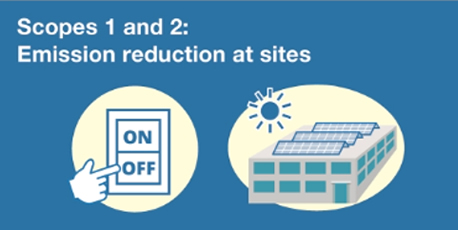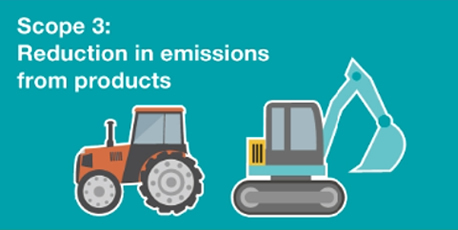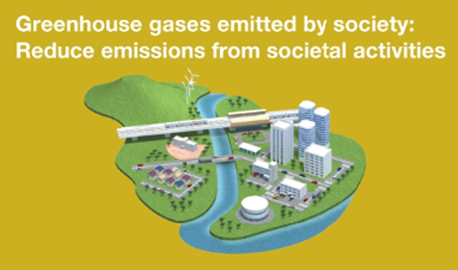Environmental Vision
In a situation with an increased uncertainty about the future due to social problems in a global scale, such as food issues and global warming, long-term, world-common goals have been set such as SDGs, the Paris Agreement, and others. For the climate change problem, the shift to a “decarbonized” society has been accelerated, with each country declaring substantially zero emissions of CO2 and carbon neutrality. Also, the move from the conventional economy that has led to mass production, mass consumption, and mass waste disposal toward a circular economy has progressed, which aims for an economy with minimized waste generation by preserving and maintaining the values of products and resources as long as possible.
With “For Earth, For Life” as its concept for environmental management, the Kubota Group aims to contribute to the realization of a sustainable society, regarding environmental conservation, including climate change countermeasures, as a priority issue in its corporate activities. The Kubota Group has formulated its “Environmental Vision,” which, together with our Long-term Vision “GMB2030,” shows the direction of our business activities toward 2050 from an environmental perspective and will promote initiatives to realize this vision.
- 1 Click the link for Environmental Management Basic Policy
Toward the Realization of the Environmental Vision
Toward the Realization of a Carbon-Neutral and Resilient Society
Procuring raw materials and components, and processing them into products, our company provides our customers with our various products. In this process, and in the use of the products by customers, energy and other resources are consumed. To continue our business globally, we need to use limited resources in an efficient and sustainable way. Toward the realization of the mitigation of climate change and carbon neutrality, we will systematically promote the reduction of greenhouse gas emissions in our business activities, a thorough reduction of waste or loss of energy based on the Kubota Production System (KPS), fuel switching, and the recovery and reuse of waste energy. In addition, we also aim to achieve a switch to 100% renewable energy for the energy used at our business sites.
In add巾on to the mitigation of climate change (controlling greenhouse gas emissions), Kubota also engages in environmental conservation activities and provides environment-conscious products and solutions to adapt to the effects of climate change (avoiding or minimizing damage brought about by climate change) and to address water and waste issues. In these ways, we are contributing to the realization of a sustainable, especially carbon-neutral and resilient society.
Greenhouse gas emissions from the food sector, including land use in the agricultural field, are said to account for about 23% of the world's total emissions. It is believed that without efficient food production, greenhouse gas emissions will increase. According to the IPCC's Sixth Assessment Report, atmospheric concentrations of methane and nitrous oxide, which have a stronger greenhouse effect than CO2, are rising and measures are needed to curb their emissions. Also, climate change is affecting the reduction and relocation of arable land, agricultural practices, and even ecosystems. Given the declining number of farm workers owing to the impact of urbanization in rural areas, more efficient food production and increased crop yield per area under cultivation are now needed.
In the "food" sector, which is one of our business areas, we believe we can reduce emissions of not only CO2, but also methane and nitrous oxide, and contribute to more efficient food production by further evolving smart agriculture, the automatic operation of farm machinery, farming technology, and water environment solutions technology. By improving the efficiency of farming, we will help reduce greenhouse gas emissions in the agricultural sector by increasing the productivity of agriculture, reducing energy consumption, conserving resources of fertilizer and pesticides, and curbing deforestation intended to expand agricultural land.
Under the influence of climate change, the frequent occurrence and intensified damage of weather disasters have become remarkable. In addition, with available water resources unevenly distributed depending on the regions, the population who cannot access safe water has risen to 1.6 billion people. Even if we succeed in controlling the global rise of temperature due to climate change to less than 1.5°C, the population who has to face water shortages is expected to increase. Also, population increase and improved living standards are assumed to further aggravate the resource and waste problems and agricultural water shortages due to mass production, mass consumption, and mass waste disposal.
In the "water and the environmental" fields, we will provide products, services, and solutions, such as products to contribute to disaster prevention and disaster recovery, and efficient water monitoring and management systems that utilize Al / loT, which are designed to avoid and mitigate damage due to the influences of climate change, including frequent occurrence of climate disasters, changes in agricultural styles, and increase in the frequency of work-related heatstroke. To promote advanced recycling of water resources and waste, we will provide resource recovery solutions and further expand our products and services for controlling water pollution and air pollution, contributing to a circular economy and natural disaster-resistant community-building, and the realization of a resilient society.
Taking on the Challenge of Carbon Neutrality

・We will promote energy-saving measures such as reduction of energy waste and loss
and productivity increase based on the Kubota Production System (KPS) concept,
and fuel conversion.
・We will expand use of renewable energy.

・We will develop electric- and fuel cell-powered agricultural machinery
and construction machinery products.
・We will promote wider use of low-carbon and non-carbon fuel in engines
and products with engines.
・To enable precise work on a larger number of operations using less energy,
we will promote efficiency improvements when using products.

・We will develop solutions that contribute to curbing greenhouse gas emissions from agriculture.
・We will provide technologies for recovering and remanufacturing resources,
and contribute to curbing greenhouse gas emissions associated with the circular economy
and resource extraction and refining.
・We will develop solutions for increasing the efficiency of urban infrastructure management.
Background in establishing the Environmental Vision
1. World Around Kubota's Business in 2050
Based on the scenarios of the Intergovernmental Panel on Climate Change (IPCC) and the World Resources Institute (WRI), we analyzed a social image in 2050 when the temperature rises by 1.5℃/2℃ and 4℃. Global environmental problems, including climate change and water risks, may not only have negative effects on our company's operation in the future, such as soaring energy and water prices and frequent occurrence of natural disasters, but also further aggravate social problems in the “food, water and the environment” fields, which are part of our company's business areas. Also, the delayed responses to these environmental problems may pose a risk to our company's business activities. To continue our global business, we believe it is essential to strike a balance between business development that can contribute to solving social problems toward the achievement of SDGs and ESG management that includes responses to the environmental problems.
World in 2050
The world population is expected to approach 10 billion people by 2050, mainly in emerging countries such as Africa and Asia, and the food demand along with the population increase is also expected to increase about 1.6 times. Also, economic development can enhance the need to improve people's living environment, and can result in an increase in global demand
for energy and consumption of many resources. The same will be applied to water demand. Water demand will increase, especially in the manufacturing industry and for the use for power generation and for domestic use, and is expected to be about 1.6 times the current demand by 2050.
Increase in food demand and water demand, expansion of energy demand due to urbanization, etc., and cultivation of new land for food production may aggravate the climate change problem. Climate change can have a huge negative impact on people's lives. If rainfall patterns are altered, conventional crop production may become impossible as arid or high precipitation belts shift geographically. Weather anomalies may also cause populations to be affected by more frequent flooding and other water damage.
If we continue our current economic activities and social activities without efficiently utilizing our limited resources, such as energy, people's current lifestyles themselves may no longer be feasible.
A World Where Temperature Rise Is Less Than 1.5℃/2℃
We believe that to achieve the goals stipulated in the Paris Agreement, each country will accelerate their moves for energy saving and the reduction of CO2 emissions, and strengthen related laws and regulations, which should result in a growing concern about climate change among markets and customers. This is why we have assumed that the needs for energy saving, decarbonization, and electrification will be enhanced.
For example, tractors, combine harvesters, rice-transplanters, construction machinery, and diesel engines, which are our company’s major products, are under application of the exhaust gas regulations of Japan, European countries, and the U.S., etc. Our diesel engines are also used for construction machinery, which plays an active role in the development of urban areas. In the future, since regulations for each country’s engines may be tightened, we believe that we need to invest in the development of diesel engines that conform to new exhaust gas regulations. Also, if each country’s efforts toward the mitigation of climate change are advanced, while the ratio of fossil-fuel power generation decreases due to strengthened carbon taxes, energy prices are expected to soar with an increase in the ratio of renewable energy power generation.
As calls for the environmentally sound performance of products grow around the world in connection with climate change, the needs for high-energy-efficiency products and solutions that enable the same effects should be enhanced also in the fields related to water treatment as well as the agricultural machinery and construction machinery that Kubota offers. In our business activities, we also believe that with a risk of increase in the energy procurement cost, energy saving and expansion of the use of renewable energy will become important issues.
A World Where the Temperature Has Risen by 4℃
If the world's average temperature rises by 4℃, with the changes in the rainfall and climate patterns, weather disasters are expected to further increase, such as with the typhoons and torrential rains which have been observed around the world recently. Depending on the areas, it may be difficult for people to access the safe water required for business activities and livelihood due to drought. These weather disasters may cause a suspension of business activities, affect agricultural produce, and increase damage on the basic needs of people's livelihood such as water infrastructure.
For instance, in coastal regions and rainy regions, heavy rain or flooding may cause inundation of plants, blackouts, logistic suspension, and delayed shipping. Also, with increased frequency and length of these weather disasters, there are concerns over further expansion of damage. Even in the production of farm products, climate change is expected to have negative influences such as causing changes of arable land and a reduction in the amount of harvested crops, and may further affect the sales of agricultural machinery. Climate change may cause the occurrence of drought, which may cause the occurrence of risks for business activities, such as water shortages and restrictions on the amount of water in the relevant regions.
While climate change is expected to affect the changes of arable land and crop production, we believe that the necessity of agricultural solutions for continuing farming even under a range of climate conditions, and of smart agriculture capable of realizing efficient production in limited land, will increase. Likewise, we believe that contributing to the building of a natural disaster-ready city that can maintain people's living environment even after the occurrence of a natural disaster will be our important task.
- The above statements are the outline of the results of scenario analysis based on the proposals of TCFD for the examination of the Kubota Group's Environmental Vision. The world in 2050 may be different from each scenario. We will continue to improve our information disclosure based on the proposals of TCFD.
2. Expected Image of Society
As people's lives become more and more enriched, new environmental problems to be solved will occur in the future. However, we do not wish to have a new society at the price of the global environment. As a result of analyzing a future society image based on the impact of climate change, the Kubota Group believes that what society expects for us in order to make the world sustainable in or after 2050 is as follows:
- Realization of carbon neutral society aimed at mitigating climate change by curbing greenhouse gas emissions from the agricultural sector
- Realization of resilient society capable of adapting to climate change, such as by preparing for natural disasters and dealing with water /air pollution and waste issues

